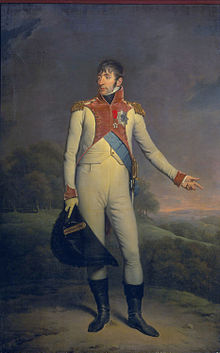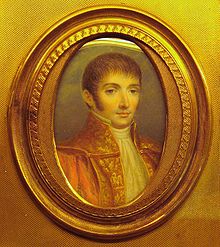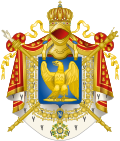- Louis Bonaparte
-
This article is about the King of Holland. For Louis-Napoléon Bonaparte, see Napoleon III.
Louis I King of Holland
Comte de Saint-Leu
King of Holland Reign June 5, 1806 - July 1, 1810
(4 years, 26 days)Coronation June 5, 1806 Predecessor None
Kingdom createdSuccessor Louis II of Holland Spouse Hortense de Beauharnais Issue Napoleon Charles, Prince Royal
Louis II of Holland
Napoleon III of FranceFull name Louis Napoleon Bonaparte House House of Bonaparte Father Carlo Buonaparte Mother Letizia Ramolino Born 2 September 1778
Ajaccio, CorsicaDied 25 July 1846 (aged 67)
Livorno, Grand Duchy of TuscanyBurial Saint-Leu-la-Forêt Religion Roman Catholicism Louis Napoléon Bonaparte, Prince Français, Comte de Saint-Leu (2 September 1778 – 25 July 1846), King of Holland (1806–10), was the fifth surviving child and the fourth surviving son of Carlo Buonaparte and Letizia Ramolino. His brother was the first Emperor of the French, Napoleon I, and his son was the last, Napoleon III.
Contents
Early life
French Monarchy -
Bonaparte DynastyNapoleon I Children Napoleon II Siblings Joseph, King of Spain Lucien, Prince of Canino Elisa, Grand Duchess of Tuscany Louis, King of Holland Pauline, Princess of Guastalla Caroline, Queen of Naples Jérôme, King of Westphalia Nephews and nieces Princess Zénaïde Princess Charlotte Prince Charles Prince Louis Prince Pierre Prince Napoleon Charles Prince Napoleon Louis Napoleon III Prince Jérôme Prince Napoleon Joseph Princess Mathilde Grandnephews and -nieces Prince Joseph Prince Lucien-Louis Prince Roland Princess Jeanne Prince Charles Prince Jerome Napoleon (V) Victor Maria Letizia, Duchess of Aosta Great Grandnephews and -nieces Princess Marie Princess Marie Clotilde Napoleon (VI) Louis Great Great Grandnephews and -nieces Napoleon (VII) Charles Princess Catherine Princess Laure Prince Jerome Great Great Great Grandnephews and -nieces Princess Caroline Prince Jean-Christophe Napoleon II Napoleon III Children Napoleon (IV), Prince Imperial Louis was born Luigi Buonaparte in Ajaccio, Corsica. He was a younger brother of Joseph Bonaparte, Napoleon I of France, Lucien Bonaparte, and Elisa Bonaparte, and the older brother of Pauline Bonaparte, Caroline Bonaparte, and Jérôme Bonaparte.
Louis Bonapart's early career was spent in the Army, and he served with Napoleon in Egypt. Thanks to his older brother, Napoleon, Louis was a General by the age of 25, although he himself felt that he had risen too high in too short a time.
Upon Louis's return to France, he was involved in Napoleon's plot to overthrow the Directory. After becoming the First Consul, Napoleon arranged for a marriage between Louis and Hortense de Beauharnais, the daughter of Empress Josephine, and hence Napoleon's stepdaughter. Hortense, who was opposed to the marriage at first, was persuaded by her mother to marry Louis for the sake of the family, and she did so.
Louis supposedly had a poor mental condition at times, and supposedly suffered from periods of mental illness.[1] Louis's "poor mental condition" may have been periods of depression caused by trying to hide his homosexuality or bisexuality.[2] These periods of depression or mental instability (records fail to distinguish) would plague Louis, and consequently Napoleon, until his death.
As the King of Holland
Napoleon made him the King of Holland on June 5, 1806. Though the older brother, Napoleon, had intended for the younger brother to be little more than a French governor of Holland, Louis took his duties as the King seriously, calling himself Koning Lodewijk I (adopting the Dutch form of his name), attempting to learn the Dutch language, and trying hard to be a responsible, independent ruler of Holland. Allegedly, when he first arrived in Holland[citation needed], he told the people he was the Konijn van 'Olland ("rabbit of 'Olland"), rather than "Koning van Holland" ("King of Holland"), because his Dutch was not very good by then. However, his attempt at speaking the Dutch language earned him some respect from his subjects.
 Early 19th century enamel of Louis Bonaparte.
Early 19th century enamel of Louis Bonaparte.
While in Holland, Louis Bonaparte declared that he was Dutch and renounced his French citizenship[citation needed]. Louis also forced his court and ministers (mostly provided by Napoleon) to speak only Dutch, and also to renounce their French citizenships. This latter was too much for his wife Hortense who, in France at the time of his demands, refused his request.
Louis could never settle on the location for his capital city while he was in Holland. He changed capitals over a dozen times, trying Amsterdam, the Hague, Rotterdam, and other places. On one occasion, after visiting the home of a wealthy Dutch merchant, he liked the place so much that he had the owner evicted so he could take up residence there. Then, Louis moved again after seven weeks. His constant moving kept the court in upheaval since they had to follow him everywhere. The European diplomatic corps went so far as to petition Bonaparte to remain in one place so they could keep up with him. This restlessness was later attributed to his alleged "lunacy".
Hortense bore Louis's sons Napoleon Charles Bonaparte and Napoleon Louis Bonaparte in Paris, while Louis was in Holland. In 1806, Louis called for his son to be sent to him in Holland, but he was again refused by Hortense, who believed that her son would never be returned to France. When Louis appealed to his brother Napoleon for help, Napoleon sided with Hortense. Napoleon kept the boy in his own court, and he even had him named the heir to the French throne prior to the birth of his own son.
Two major tragedies occurred during the reign of Louis Bonaparte: the explosion of a cargo ship loaded with gunpowder in the heart of the city of Leiden in 1807, and a major flood in Holland in 1809. In both instances, Louis personally and effectively oversaw local relief efforts, which helped earn him the moniker of Louis the Good.
Louis Bonaparte's reign of the Netherlands was short-lived, however, which was due to two factors. The first was that Napoleon wanted to reduce the value of French loans from Dutch investors by two-thirds, meaning a serious economic blow to the Netherlands. The second factor was the one that became the pretext for Napoleon's demand of Louis's abdication. As Napoleon was preparing an army for his invasion of Russia, he wanted troops from the entire region under his control, the allied border countries. This included troops from the Netherlands. Louis, confronted by his brother's demand, refused point-blank. Napoleon then accused Louis of putting Dutch interests above those of France, and removed most of the French forces in Holland for the coming war in the east, leaving only about 9,000 garrison soldiers in the country. Unfortunately for Louis, the English landed an army of 40,000 in 1809 in an attempt to capture Antwerp and Flushing. With Louis unable to defend his realm, France sent 80,000 militiamen, commanded by future King of Sweden Jean-Baptiste Bernadotte and successfully repelled the invasion. Napoleon then suggested that Louis should abdicate, citing Louis's inability to protect Holland as a reason. Louis refused. Napoleon finally invaded Holland on 1 July 1810, forcing Louis to abdicate the same day, and annexed the entire Kingdom of Holland on 9 July.
Years of exile
Louis Bonaparte also had been made the Count of Saint-Leu[citation needed]. He was appointed as the Constable of France in 1808, a strictly honorary title.
After his Dutch kingdom was taken away from him the Austrian Emperor Francis I offered him asylum. Between 1811 and 1813 he found refuge in Graz, where he turned to writing and poetry. Louis wrote to Napoleon after the latter's defeat in Russia to request that the Dutch throne be restored to him; however, Napoleon refused. His request to visit the Netherlands was denied several times by King William I of the Netherlands; King William II of the Netherlands allowed him a visit in 1840. Although traveling in the Netherlands under a false name, some people found out that it was their former king, which led to a cheering crowd gathering under the window of his hotel room. It is said he was quite moved by this demonstration of affection from his former subjects.
After the deaths of both Napoleon Bonaparte in 1821, and of his eldest brother Joseph in 1844, Louis was seen by the Bonapartists as the rightful Emperor of the French, although Louis took little action himself to advance the claim. (Louis's son and heir, the future Emperor Napoleon III, on the other hand, was at that time being imprisoned in France for having tried to engineer a Bonapartist coup d'état.)
Louis Bonaparte died on July 25, 1846 in Livorno, and his remains were buried at Saint-Leu-la-Forêt, Île-de-France.
Marriage and children
Louis was married on January 4, 1802, to Hortense de Beauharnais, the daughter of the deceased general Alexandre, Vicomte de Beauharnais and his wife Josephine Tascher de la Pagerie. Josephine was the first wife of Louis's brother Napoleon. Thus Hortense was also Louis's step-niece.
This marriage had been forced upon them and was rather loveless, though they supposedly consummated it and interacted often enough to produce three sons. As a rule, the Bonapartes, with the exception of Napoleon, loathed the Beauharnais. Hortense also certainly had extra-marital lovers.[3]
Hortense de Beauharnais gave birth to three sons which were officially claimed by Louis Bonaparte, despite his own doubts about their paternity:
- Napoleon Charles Bonaparte, born 10 October 1802[1], Prince Royal of Holland. When he died on 5 May 1807 at 4½ years of age, his body lay in state at Notre Dame Cathedral in Paris. He is buried at Saint-Leu-La-Foret, Ile-de-France.
- Napoleon Louis Bonaparte, born 11 October 1804. Became Prince Royal of Holland on his brother's death, and was King Lodewijk II for five days between his father's abdication and the fall of Holland to Napoleon Bonaparte's invading army. Napoleon Louis Bonaparte died on 17 March 1831, and his remains were buried at Saint-Leu-La-Foret, Île-de-France.
- Charles Louis-Napoleon Bonaparte, (1808–73). Born in Paris, he was the third and last son, and would become Emperor Napoleon III of France (1852–70).
Louis Bonaparte was also supposedly the father of an illegitimate son, François de Castelvecchio, (26 April 1826 – 29 May 1869)[citation needed]. He was born in Rome, Italy and died in Rennes.
Ancestry
Ancestors of Louis Bonaparte 16. Giuseppe Maria Buonaparte
(1663-1703)8. Sebastiano Nicola Buonaparte
(1683–1720/60)17. Maria Colonna Bozzi
(1668–1704)4. Giuseppe Maria Buonaparte
(1713–1763)18. Carlo Tusoli 9. Maria Anna Tusoli
(1690–1760)19. Isabella 2. Carlo Maria Buonaparte
(1746–1785)10. Giuseppe Maria Paravisini 5. Maria Saveria Paravisini
(1715–bef. 1750)22. Angelo Agostino Salineri 11. Maria Angela Salineri 23. Francetta Merezano 1. Louis Bonaparte, King of Holland and Comte de Saint-Leu
(1778–1846)24. Giovanni Girolamo Ramolino
(1645–?)12. Giovanni Agostino Ramolino 25. Maria Laetitia Boggiano 6. Giovanni Geronimo Ramolino (1723–1755) 26. Andrea Peri
(1669–?)13. Angela Maria Peri 27. Maria Maddalena Colonna d'Istria 3. Maria Letizia Ramolino
(1750–1836)28. Giovanni Antonio Pietrasanta 14. Giuseppe Maria Pietrasanta 7. Angela Maria Pietrasanta (1725–1790) 15. Maria Josephine Malerba See also
References
- ^ Farquhar, Michael (2001). A Treasure of Royal Scandals, p.163. Penguin Books, New York. ISBN 0739420259.
- ^ McMillan, James (1991). "Napoleon III", p.7. Longman Group United Kingdom Limited, Essex. ISBN 0-582-08333-2.
- ^ McMillan
- Napoleon Bonaparte: A Life, by Alan Schom
Louis BonaparteBorn: 2 September 1778 Died: 25 July 1846Regnal titles New title King of Holland
1806–1810Succeeded by
Louis IITitles in pretence Preceded by
Joseph Bonaparte— TITULAR —
Emperor of the French
1844–1846Succeeded by
Napoléon III— TITULAR —
Bonapartist pretender to the French throne
Prince Napoléon Line
1844–1846Pretenders to the French throne since 1792 Monarchy in exile (1792–1815)
Legitimist pretenders (1830–present) 1830 Charles X 1836 Louis XIX 1844 Henri V 1883 Jean III 1887 Charles XI 1909 Jacques I 1931 Alphonse I 1936 Alphonse II 1941 Jacques II 1975 Alphonse III 1989 Louis XX presentOrléanist pretenders (1848–present) 1848 Louis-Philippe I 1850 Philippe VII (or Louis-Philippe II) 1894 Philippe VIII 1926 Jean III 1940 Henri VI 1999 Henri VII presentBonapartist Prince Imperial (1814–present) 1814 1815 Napoléon I 1821 Napoléon II 1832 Joseph 1844 Louis 1846 Napoléon III (Emperor 1852–1870) 1873 Napoléon IV Eugene 1879 Napoléon V Victor 1926 Napoléon VI Louis 1997 Napoléon VII Charles/Napoléon VIII Jean-Christophe present (disputed)Bonapartist Prince Canino (1832–1924) Bonaparte family 1st generation Joseph I of Spain · Napoléon I · Lucien, Prince of Canino and Musignano · Elisa, Grand Duchess of Tuscany · Louis I of Holland · Pauline, Princess of Guastalla · Caroline, Queen of Naples and Sicily · Jérôme of Westfalia

2nd generation Edmond Raymer Bonaparte I · Zénaïde, Princess of Canino and Musignano · Princess Charlotte · Napoléon II · Charlotte, Princess Mario Gabrielli · Princess Victoire · Christine, Lady Dudley Coutts Stuart · Charles Lucien, Prince of Canino and Musignano · Laetitia, Lady Wyse · Prince Joseph · Jeanne, Marchioness Honorato Honrati · Prince Paul · Prince Louis Lucien · Prince Pierre Napoléon · Prince Antoine · Alexandrine, Countess Vincenzo Valentini di Laviano · Princess Constance · Napoléon Charles, Prince Royal of Holland · Louis II of Holland · Napoléon III · Prince Jérôme Napoléon · Jérôme Napoléon Charles, Prince of Montfort · Mathilde, Princess of San Donato · Napoléon Joseph, Prince Napoléon
3rd generation Joseph Lucien, Prince of Canino and Musignano · Princess Alexandrine · Cardinal Lucien Louis, Prince of Canino and Musignano · Julie, Marchioness of Roccagiovine · Charlotte, Countess Pietro Primoli di Foglia · Princess Léonie · Marie Desirée, Comtesse Paolo Campello della Spina · Augusta, Princess Placido Gabrielli · Napoléon Charles, Prince of Canino and Musignano · Bathile, Countess of Cambacérès · Princess Albertine · Prince Charles · Edmond Raymer Bonaparte II · Roland, Prince of Canino and Musignano · Jeanne, Marchioness of Villeneuve-Escaplon · Napoléon Eugène, Prince Imperial of France · Prince Jérôme Napoléon · Prince Charles Joseph · Victor, Prince Napoléon · Prince Napoléon Louis · Marie Letizia, Duchess of Aosta · William Charles Bonaparte-Wyse · Laetitia Marie Wyse Bonaparte · Lucien Napoléon Bonaparte-Wyse
4th generation Princess Mary, Mrs. Enrico Gotti · Eugénie, Princess of La Moskowa · Marie, Princess George of Greece and Denmark · Louise Eugenie, Countess Adam of Moltke-Huitfeld · Prince Jérôme Napoléon · Marie Clotilde, Countess Serge de Witt · Louis, Prince Napoléon · Andrew Nicholas Bonaparte-Wyse
5th generation Charles, Prince Napoléon · Princess Catherine, Mrs. Jean Dualé · Princess Laure, Mrs. Jean-Claude Leconte · Prince Jérôme
6th generation Princess Caroline · Jean-Christophe, Prince Napoléon · Princess Sophie
Categories:- 1778 births
- 1846 deaths
- House of Bonaparte
- French people of Italian descent
- People from Ajaccio
- Knights of the Golden Fleece
- Bonapartist pretenders to the French throne
- Dutch monarchs
- People of the Patriottentijd
- French Roman Catholics
- Princes of France (Bonaparte)
Wikimedia Foundation. 2010.
